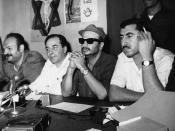"Arafat and the PLO"
Although having a large following, I don't believe that the Yasser Arafat, as the leader of the PLO, represents the best interests of the Palestinian people. Arafat talks of peace but his actions show his true intentions. David Pryce-Jones said he best when he observed in The Closed Circle: An Interpretation of the Arabs," wherever they live, they observe for themselves that the PLO is a means to enrichment and aggrandizement for the unscrupulous few, but death and destruction for everyone else." I feel that history shows Arafat's true colors time and time again. But first, to fully understand the PLO and Arafat's rise to power, we must look back at its beginnings.
In 1964, during in Arab summit in Cario, the President of Egypt, Gamel Abdel Nasser, with the consensus of those present, made the decision to form the PLO. This was done in an effort to unite the various Palestinian groups and to offer an alternative to Yasser Arafat's extremist Al Fatah organization that formed in the 1950s.
This establishment would also allow for Nasser to channel Palestinian support for himself and his leadership role in the Arab world. (CQ, 34)
The PLO soon had an army of about 10,000 that began training mostly in the Gaza Strip, where they were fully under Egyptian control. Jordan was unable to resist the PLO influx in its territory because of the Palestinian support of the populace. After the Arab defeat in the Six-Day War, the PLO was in disarray, its army totally destroyed and its members melting back into the Gaza population from whence they came. (Pryce-Jones, Defeat 52) This left the door wide open for new leadership to emerge.
During this time, despite Nasser's efforts to control the Palestinian movement, other independent resistance groups...


